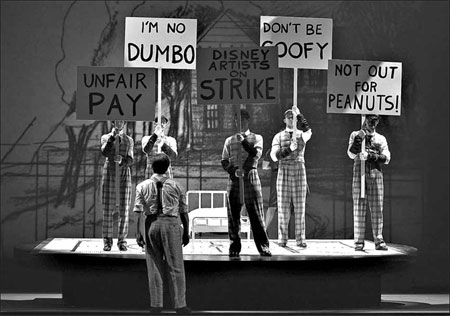In Spain, austerity takes to stage
Updated: 2013-02-24 07:53
By Zachary Woolfe(The New York Times)
|
|||||||
|
Javier Del Real / Teatro Real, via Agence France-Presse - Getty Images |
|
Among the institutions struggling in Spain: the Teatro Real in Madrid, above, and the Palau de les Arts Reina Sofía in Valencia. Jose Jordan / Agence France-Presse - Getty Images |
BARCELONA, Spain - There is no sign marking the door to La Poderosa, a dance and performance space on a scruffy street in the Raval neighborhood here.
Up a flight of stairs is an airy yet cozy loft with a slightly raised platform for performances at one end, a bar at the other and some tables and chairs. One afternoon recently, Javier Vaquero Ollero sipped a beer and talked about the future.
"We really live day by day," said Mr. Vaquero Ollero, 28, a dancer and choreographer and a member of the collective that runs the space. "You cannot project about the future. You cannot have an idea of a project or design a certain kind of artistic project from one year's distance, because you actually don't know if you can pay the rent next month."
The rent on La Poderosa's loft is about $1,100 a month. But it's hard to pay that when just a trickle is coming in. Like most arts organizations in Spain, the space used to draw the better part of its income from public subsidies. At the high point, a few years ago, La Poderosa was receiving about $90,000 a year from governmental sources. It used that for rent, performers, technical costs and small salaries for three employees.
Now it gets nothing.
The government's austerity-focused response to Spain's recession has been devastating for culture. Up to 50 percent of arts budgets in Europe comes from government subsidies, higher than in many other parts of the world. Private donations in Europe are generally not tax deductible, so when subsidies are cut, it is hard to generate new income to compensate. In Spain ticket sales, the largest remaining source of revenue, have been affected by a large hike in the value-added tax on tickets, to 21 percent from 8 percent.
A report produced for the Culture Ministry and updated in 2012 found that since 2009 the average cultural organization had reduced its budget or volume of activity by 49.8 percent.
The situation affects both the underground, experimental world epitomized by La Poderosa and much more famous, maintream institutions and personalities.
The Gran Teatre del Liceu in Barcelona, one of the country's two leading opera houses, has laid off about 100 employees. When asked what had changed at the Liceu since the crisis, Joan Francesc Marco, the theater's general director, said, "everything."
The tenor Placido Domingo recently said, "The hope for everybody is that we go back to the level of quantity and quality we had before the crisis."
But quantity is a daunting problem at the Palau de les Arts Reina Sofia in Valencia, where Mr. Domingo was singing in the Verdi rarity "I Due Foscari." The house's budget and performance schedule have both been cut in half, and its soaring, retro-futurist Santiago Calatrava building, which opened in 2005, therefore sits dormant most of the year.
"What has been spent here was at a moment when Spain had all the money," the Palau's director, Helga Schmidt, said of the building, part of the sprawling, expensive Calatrava-designed City of Arts and Sciences complex. "But in the future politicians and those who have to pay will have to be very careful."
Cuts forced the Museo Nacional del Prado in Madrid to cancel a planned Lucian Freud retrospective. The Teatro Real, in the same city, has faced cuts of a third of its budget, forcing the cancellation of a much-anticipated three-year series of opera productions in collaboration with the Berlin Philharmonic.
Mr. Vaquero Ollero, of La Poderosa, is part of a group of young artists called Ocho Octubre, named after the date last fall when it met for the first time in response to a wave of subsidy cuts. The organization aims to lobby the government, to train artists in self-sustainability strategies and to connect the arts with other areas experiencing drastic cuts, from health to education.
A few years ago an abandoned brothel in Madrid opened as a kind of microtheater, offering short plays before an audience of only a dozen or so. Such intimate performance experiences have expanded into something of a movement. Mr. Vaquero Ollero has twice danced in performances that took place in people's homes. There is less work being done, he said, but with no need to answer to anyone for financing, what remains is more raw and experimental.
"When you know you don't have a theater, it provokes something very different," he said.
As dancing gigs in Barcelona have dried up, Mr. Vaquero Ollero spends more of his time working abroad. He has considered moving back in with his parents, as many young people he knows have, or leaving for Mexico City or Brazil. "I'm not here to suffer," he said.
The New York Times
(China Daily 02/24/2013 page12)

